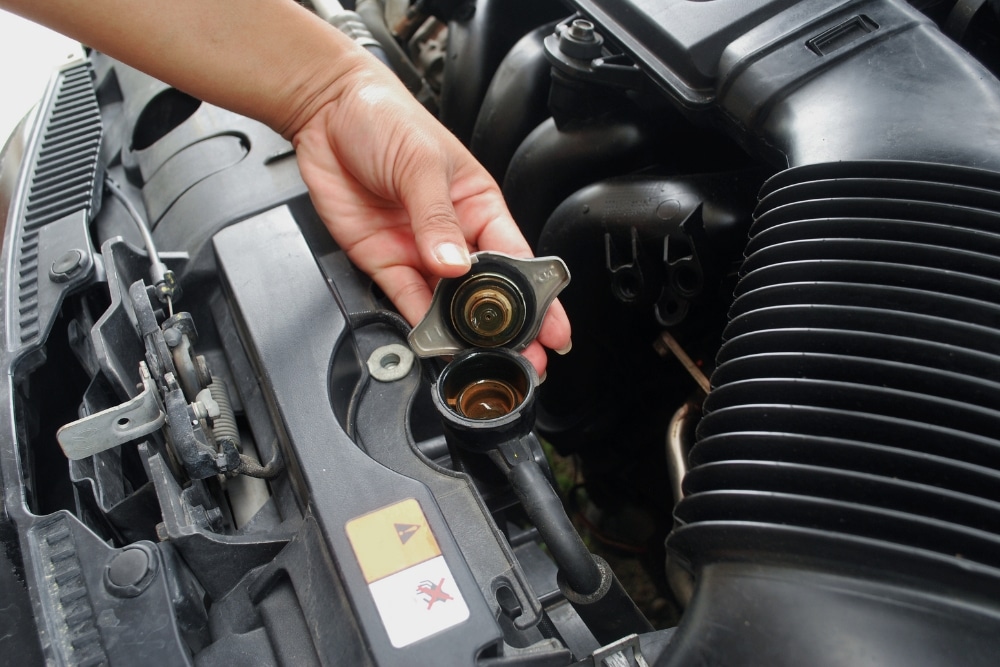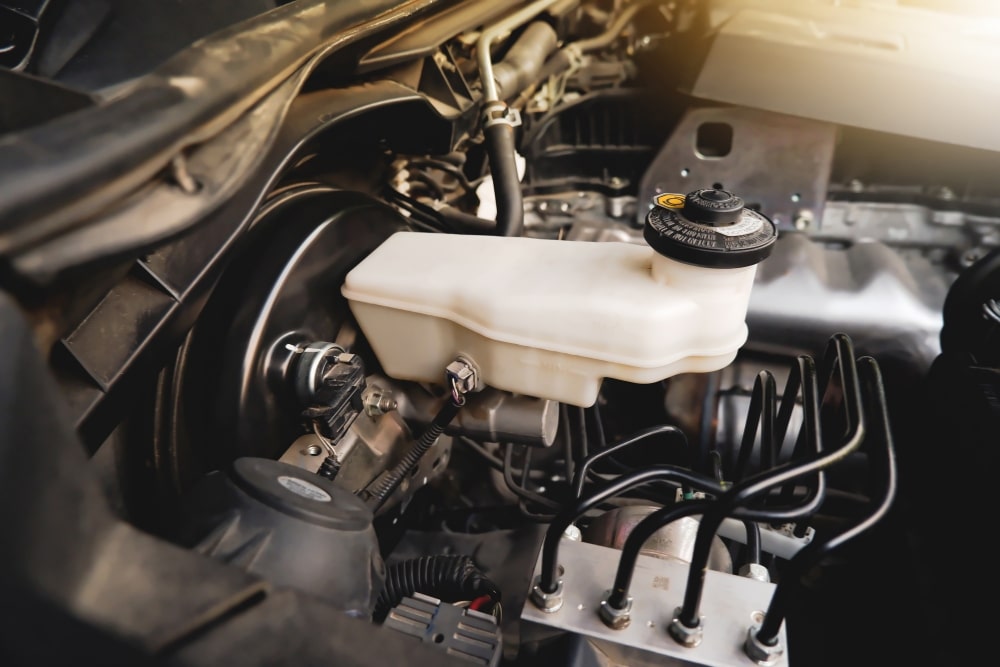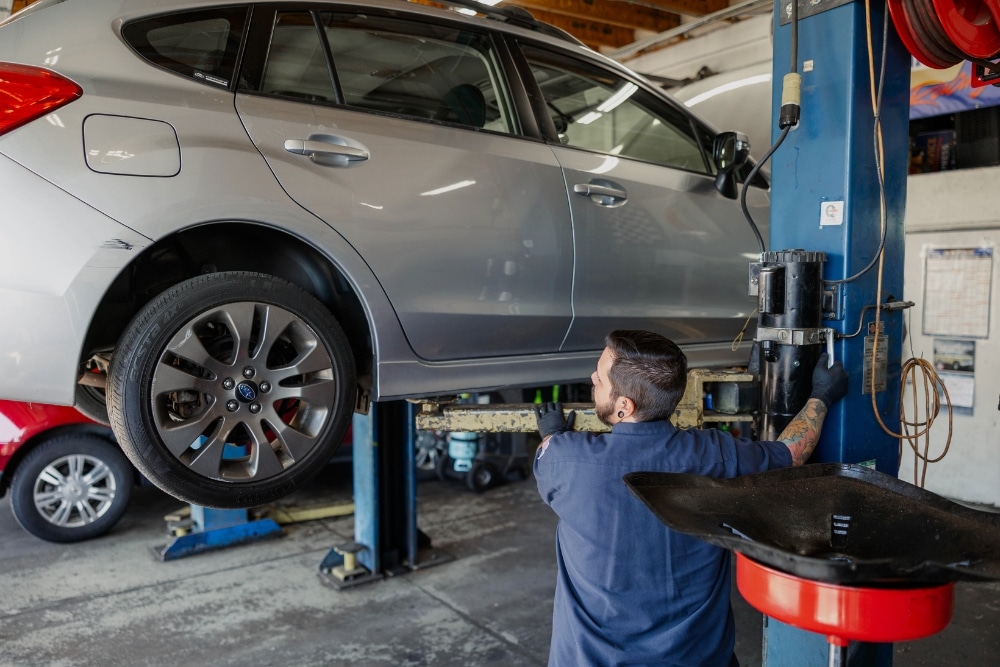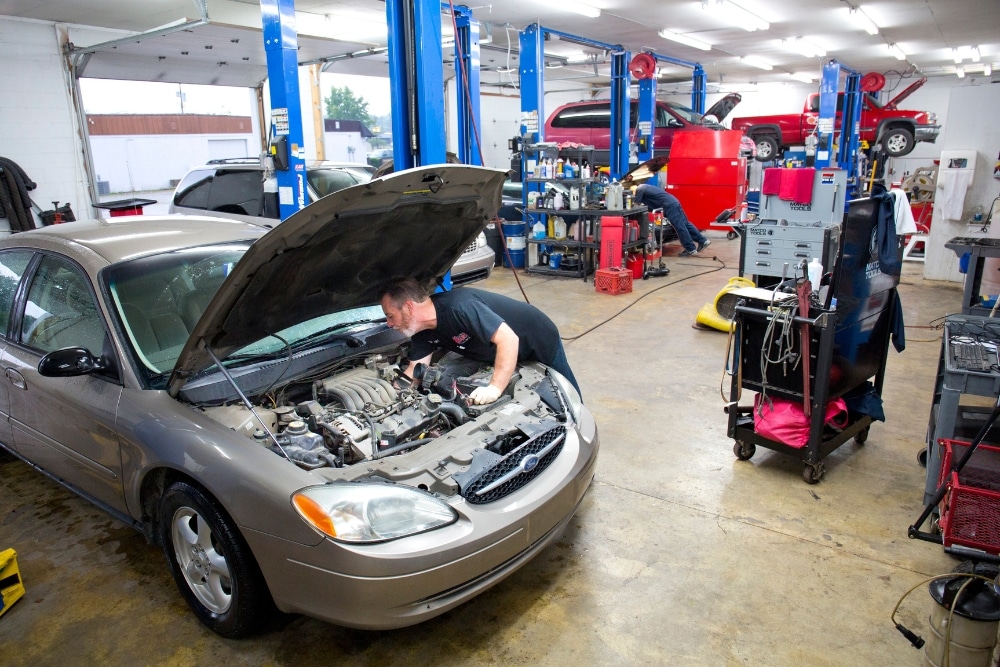Why a Quick Brake Inspection in Colorado Springs Could Save You This Winter

Winter brake inspections catch worn pads, contaminated brake fluid, and failing components before they become dangerous on icy Colorado roads. Your braking system faces unique challenges when temperatures drop: thickened brake fluid, corroded rotors from road salt, and extra demands on your ABS that can reveal hidden weaknesses. Express Auto Repair has spent over 20 years helping Colorado Springs drivers prepare for winter, and we’ve learned that the difference between a safe stop and a scary slide often comes down to one simple decision made before the first snowfall.
We’ll show you what winter does to your brakes, how to recognize the warning signs, what a thorough inspection involves, and why catching small problems early saves you from bigger headaches when the weather turns.
The Hidden Dangers Winter Brings to Your Braking System
Winter isn’t just tough on drivers. It’s equally brutal on your vehicle’s most important safety system. Cold temperatures, road salt, moisture, and ice work together to compromise your stopping power in ways most drivers never consider.
What Freezing Temperatures Do to Brake Components
Cold weather attacks every part of your braking system:
- Brake Fluid Performance: Thickens in freezing temperatures, reducing hydraulic pressure transfer
- Metal Contraction: Components shrink, altering the precise tolerances your system needs
- Rubber Flexibility: Seals and hoses become brittle, increasing leak risks
- Moisture Problems: Water contamination in brake fluid can actually freeze in brake lines
These changes happen gradually, so many drivers don’t notice until they’re already facing a dangerous situation on icy roads.
The Corrosion Problem Nobody Talks About
Colorado Springs uses road salt and de-icing chemicals to keep highways safe, but these substances are highly corrosive to brake components. When mixed with moisture from snow and ice, they create a corrosive slush that attacks:
- Brake rotors and drums
- Caliper assemblies and pistons
- Brake lines and fittings
- ABS sensors and wiring
Regular inspections catch corrosion before it leads to component failure
How Winter Driving Puts Extra Stress on Your ABS
Your Anti-lock Braking System works overtime during winter. This sophisticated system prevents wheel lockup on slippery surfaces by rapidly pulsing your brakes up to 15 times per second. But here’s what most people don’t realize: ABS can only work with the components it has.
Worn brake pads reduce the system’s effectiveness. Contaminated brake fluid slows response time. Damaged rotors create unpredictable friction. When these elements combine with icy roads, your ABS can’t deliver the protection it’s designed to provide.
Think of it this way: ABS is like having a professional driver’s reflexes, but if your brake pads are worn down to metal, even the best reflexes can’t overcome physics.
What Gets Checked During a Professional Brake Inspection
A thorough brake inspection goes far beyond just looking at your pads. Here’s what happens when you bring your vehicle in for a comprehensive assessment.
Brake Pad and Rotor Measurement
Brake Pads: Measured on all four wheels for remaining material thickness. Safe winter driving requires at least 3-4 millimeters. Less than that dramatically increases stopping distances on wet or icy surfaces.
Rotors: Checked for three critical factors:
- Thickness measurements against manufacturer specifications
- Surface condition and scoring depth
- Warping or runout that causes vibration
Brake Fluid Testing and System Integrity
Brake fluid absorbs moisture over time, which creates two serious problems. First, water contamination lowers the boiling point, causing brake fade during heavy use. Second, moisture can freeze in brake lines during extreme cold, potentially causing complete brake failure.
Professional testing includes:
- Moisture content analysis
- Visual inspection for color and consistency
- Pressure testing the entire hydraulic system
- Leak detection at lines, hoses, and calipers
Schedule your brake inspection today.
Electronic System and Sensor Verification
Modern vehicles rely on wheel speed sensors for ABS function. Road debris, salt buildup, and corrosion damage these sensors or their wiring. Professional diagnostic scanners verify that all sensors read correctly and check for stored fault codes in your vehicle’s computer.
Caliper Operation Assessment
Brake calipers must move freely to apply even pressure. Corroded slides and pins cause:
- Uneven braking performance
- Vehicle pulling to one side
- Premature pad wear
- Reduced stopping power
Inspection includes lubricating all hardware with high-temperature brake grease, checking caliper pistons for leaks, and verifying proper retraction after brake release.
Warning Signs vs. Normal Brake Behavior: Know the Difference
| Symptom | Normal Behavior | Needs Attention |
|---|---|---|
| Brake Noise | Occasional light squeaking after rain or morning dew | Constant squealing, grinding, or scraping sounds |
| Pedal Feel | Firm and consistent with slight give | Spongy, soft, or sinks to floor with pressure |
| Stopping Distance | Consistent and predictable | Noticeably longer or varies between stops |
| Steering While Braking | Vehicle tracks straight | Pulls left or right during brake application |
| Pedal Response | Smooth engagement | Pulsing, vibration, or grabbing sensation |
| Dashboard Lights | No brake-related warnings | ABS light, brake warning light, or traction control light stays on |
If you’re experiencing symptoms in the “Needs Attention” column, don’t delay. Quick action prevents minor issues from becoming major safety hazards or expensive repairs.
The Real Cost of Delaying Brake Maintenance
Many drivers put off brake service because they think it’s expensive. But here’s what actually happens when you wait:
- Worn Pads Damage Rotors: When pads wear down to metal, they score your rotors.
- Small Leaks Become System Failures: A minor brake fluid leak that costs little to fix can lead to complete brake system failure, leaving you stranded or worse.
- Uneven Wear Multiplies Problems: One sticking caliper causes rapid pad wear on that wheel, but it also puts extra stress on the opposite side, creating additional repair needs.
- Winter Amplifies Everything: Problems that might be manageable in summer become dangerous in winter conditions. The margin for error disappears when roads are icy.
Why Express Auto Repair for Your Winter Brake Service
With over 20 years serving Colorado Springs drivers, we understand what local winter conditions demand from your brakes. Our approach combines expertise, transparency, and convenience.
Our Credentials:
- ASE Blue Seal of Excellence: Highest level of automotive service certification
- NAPA Gold Certified: The only one in Colorado Springs, ensuring highest quality parts and service
- AAA Approved: All three locations meet strict AAA standards
- BBB Accredited: A+ rating backed by customer satisfaction
What Sets Us Apart:
- Same-day service gets you back on the road without compromising quality
- Digital Vehicle Inspections with photos and videos show you exactly what we find
- NAPA AutoCare Peace of Mind Warranty covers 36 months or 36,000 miles
- Instant online estimates let you see pricing before you commit
- Multiple financing options through Snap, DigniFi, Koalifi, and NAPA Easy Pay
- We don’t sell parts separately. We focus entirely on expert repair and maintenance services.
We’re conveniently located near major highways at all three locations. Our Briargate location sits right next to Chapel Hills Mall, making us easy to find whether you’re a local resident or passing through.
Beyond Brakes: Complete Winter Vehicle Preparation
While brake inspection is critical, comprehensive winter preparation includes several other safety systems:
- Tire Condition: Tread depth and pressure directly affect braking performance
- Battery Health: Cold-cranking amps determine if you’ll start on frigid mornings
- Cooling System: Antifreeze protection prevents engine damage and ensures proper heater operation
- Visibility Systems: Windshield wipers and washer fluid keep your view clear
Taking a complete approach to winter vehicle preparation gives you confidence no matter what Colorado weather brings.
Note: Our Briargate location does not currently offer tire sales or wheel alignments. These services are available at our Montebello and Galley Road locations.
FAQs About Winter Brake Inspections and Brake Repair
How do cold temperatures affect brake performance?
Cold temperatures cause brake fluid to thicken, reducing hydraulic efficiency, and make rubber components less flexible, which can decrease overall braking effectiveness. Metal parts also contract in the cold, potentially affecting the precise tolerances your brake system requires for optimal performance.
What are signs my brakes need servicing?
Common signs include squealing or grinding noises, vibration in the brake pedal, pulling to one side when braking, a soft or spongy pedal feel, and dashboard warning lights. Any of these symptoms indicates your brakes need professional inspection right away to ensure safe operation.
How often should brakes be inspected?
Brakes should be inspected at least twice a year, typically during spring and fall, or every 12,000 miles. However, before winter weather arrives, it’s wise to have a dedicated brake inspection to ensure all components are ready for challenging driving conditions.
Are squeaky brakes dangerous?
Squeaky brakes aren’t always dangerous, but they shouldn’t be ignored. Light squeaking can result from brake dust or moisture, but persistent squealing often indicates worn brake pads that need replacement. Grinding noises always indicate severe wear that requires immediate attention to prevent rotor damage.
Can worn brake pads affect my ABS system?
Yes, worn brake pads significantly impact ABS performance. When pads are too thin, the system can’t modulate brake pressure effectively, reducing your control on slippery surfaces. Worn pads also increase stopping distances, which defeats the purpose of having ABS protection during emergency stops.
Schedule Your Brake Inspection in Colorado Springs Today
Before the next snowfall hits Colorado Springs, make one smart move: schedule your brake inspection with Express Auto Repair. Our three locations mean you’re never far from expert brake service, and with same-day appointments available, there’s no reason to put your safety at risk. From routine inspections to brake pad replacement and complete repairs, we’ve got you covered with the best warranty in the business.
We’re ready to serve you at:
- Montebello Location: 5360 Montebello Ln, Colorado Springs, CO 80918 | (719) 358-9109
- Galley Road Location: 3655 Galley Rd, Colorado Springs, CO 80909 | (719) 630-8729
- Briargate Location: 1815 Briargate Blvd, Colorado Springs, CO 80920 | (719) 698-3565
All three locations are AAA-approved and staffed by ASE-certified technicians who know Colorado winter driving. Schedule your appointment online now and enjoy the confidence that comes with brakes you can trust.
Related Posts

Why a Fall Cooling System Flush Matters for Colorado Springs Drivers
Express Auto Repair has kept Colorado Springs drivers road-ready for over 20 years. This fall, protect your engine

Brake Fluid Replacement in Colorado Springs: How Often Is Enough?
Express Auto Repair has proudly served Colorado Springs drivers for over 20 years, providing trusted auto care with

Trusted Auto Repair in Colorado Springs — Why Express Auto Repair Lasts
Express Auto Repair has been trusted for over 20 years, providing quality auto repair in Colorado Springs, CO

Late Summer Car Maintenance Tips for Colorado Springs Drivers
Late summer in Colorado Springs brings heat, storms, and traffic that strain your car. Express Auto Repair helps
